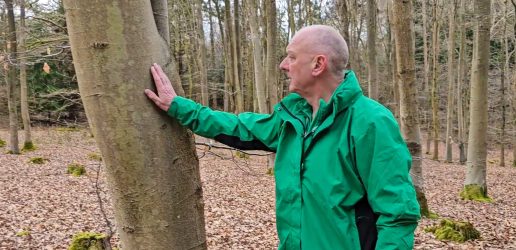Forest Research is proud to be a partner in a major bacterial plant diseases research programme, supported by UK Research and Innovation’s Strategic Priorities Fund and announced by the Parliamentary Under-Secretary of State, Right Honourable Lord Henley.
Co-ordinated by the John Innes Centre, “BRIGIT” brings together ten leading UK research organisations in a £4.85m programme to improve methods of diagnosis and detection of Xylella fastidiosa to identify factors that could lead to its spread, and to prepare to minimise the risk of the pathogen to the UK.
Dr Mariella Marzano from the Social and Economic Research Group at Forest Research said:
“We are delighted that our interdisciplinary team is involved with this consortium and across most of the individual work packages. Our expertise in pathology, entomology, citizen science and the social dimensions of plant health will be an important contribution to reducing the potential impacts of Xylella.”
The research carried out by the consortium will focus on how Xylella may spread in the UK either via insect vectors or via transport of plants across the UK by humans. A key focus will be introducing and improving best practice in the horticultural trade, to mitigate the impact of any introduction.
The BRIGIT consortium involves scientists across a spectrum of biological and social sciences, including genomics and molecular biology, plant pathology, entomology, ecology, anthropology and economics, and engages stakeholders and policymakers.
The ten institutions in the BRIGIT consortium are: John Innes Centre, Amgueddfa Cymru-National Museum Wales (NMU), Centre for Ecology & Hydrology, Fera Science Ltd, Forest Research, Royal Horticultural Society, Science and Advice for Scottish Agriculture, The University of Salford, The University of Stirling and the University of Sussex. The consortium will collaborate with international scientists and organisations, including the University of Lisbon on further characterisation of the insect vector.
BRIGIT includes four work packages:
Co-design, crowdsourcing and knowledge exchange. To provide information about the botany of plant hosts for Xylella fastidiosa and their typical symptoms of infection in plants. Open access databases on insect vector distributions, taxonomy and genome sequence data will be made available online for wider audiences.
Enhancing diagnostic capabilities. Improve various aspects of detection of Xylella fastidiosa in plants and insect vectors. Fera Science Ltd will co-ordinate work within BRIGIT on targeted sampling and diagnostic sensitivity for more reliable detection of the bacteria in diverse plant and tree species. New diagnostic techniques will be explored to rapidly detect sources of introduction.
Investigating insect vector biology. Generate a better understanding of the biology of the estimated 20 xylem-feeding insect species that may transmit Xylella fastidiosa in the UK. The geographic distribution of these insect species and the plant species they colonise across Europe will be investigated. Genetic population structures of these species will be captured to identify insect migration routes between habitats and across the UK.
Xylella fastidiosa epidemiology modelling. Generate models for fine and large-scale dispersal of Xylella fastidiosa via insect vectors and plant transport. This will include a human behaviour component to investigate the effects of human movement of plants on disease spread, which will inform surveillance and control strategies
The overall bacterial plant diseases programme is a £17.7m collaboration between UK Research and Innovation Councils, the Biotechnology and Biological Sciences Research Council (BBSRC) and the Natural Environment Research Council (NERC) – together with the Department for Environment, Food and Rural Affairs (Defra) and the Scottish Government who are providing £1.1m of additional funding.
Professor Nicola Spence, Chief Plant Health Officer and Deputy Director for plant and bee health at Defra said: “I am delighted that UKRI, together with co-funders Defra and the Scottish Government, has agreed to fund this crucial research which will help us to better control bacterial plant diseases in the future. Protecting the UK’s plants from pests and diseases remains one of my Department’s highest priorities, and we need robust science to underpin our actions to combat these threats.
Xylella fastidiosa is one such bacterial disease and will form the focus of the first phase of the research programme. The knowledge gained through this programme should assist us in further optimising our ongoing surveillance and ensure that our contingency plans are underpinned by the most up-to-date evidence available.”
Professor Saskia Hogenhout, project leader at the John Innes Centre and principal investigator of BRIGIT, says: “Despite the impact of this disease, we know very little about how the bacteria might spread in Northern Europe; the majority of research on Xylella and its insect vectors has been done in warmer southern climates. We believe this consortium is much-needed, bringing a joined-up approach to tackle a potentially devastating plant disease.”

Forest Research, in partnership with Edinburgh Napier University, have taken a first step in systematically assessing the timber potential of underutilised species in the UK.
Tree professionals working in arboriculture are being asked to take part in a new tree health survey as part of a DEFRA-funded project looking at pathways and practices concerning the tree disease, canker stain of plane.

Nature, the world’s leading multidisciplinary science journal, has published findings from a new global study investigating which tree species fix the most carbon.

Forest Research, in partnership with Edinburgh Napier University, have taken a first step in systematically assessing the timber potential of underutilised species in the UK.
Tree professionals working in arboriculture are being asked to take part in a new tree health survey as part of a DEFRA-funded project looking at pathways and practices concerning the tree disease, canker stain of plane.

Nature, the world’s leading multidisciplinary science journal, has published findings from a new global study investigating which tree species fix the most carbon.